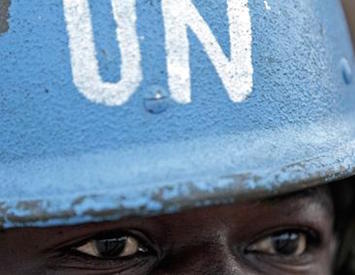'It appears that, through omission, or self-censorship, the official line on Afghanistan is in safe hands with our supposedly "left wing" ABC', writes Adam Hughes Henry.
A recent interview by ABC News 24 host Kim Landers with Professor David Horner might have been a wide ranging discussion about war history. In regards to Australian defence matters and military history, the technical details of what Horner would not know, could only be relatively miniscule. He is acknowledged as a very good military historian. Hence an ABC interview with Horner about the historical context of the recent tragic deaths of five Australian soldiers in Afghanistan. This was, as we were told, the deadliest day for the Australian military since September 1971, in Vietnam. The interview might have focused on this point in historical detail, but at 2 minutes 40 seconds instead moved onto Australian support for the troops in Afghanistan. This question may as well have been written by the Department of Defence.
Kim Landers: How important is it that there is united political support in Australia at this moment for the war in Afghanistan, and certainly for our current mission to be training Afghan forces in order to try and hand over some of that responsibility for security?
David Horner: Well, it is always good when troops on operations know that the people of Australia are behind them. That’s a great boost to troops when they are on operations. The last thing they what or need, or want to have, when dealing with a combat situation, or an operational situation, is a concern that what they are doing is not appreciated from home.
Kim Landers: Because it hasn’t always been the case in the past has it?
David Horner: In Vietnam, there were elements of that, although most of the time the soldiers just of got down and just did the job that they were supposed to do. But it is disconcerting if you feel if you are not supported from home. The troops in Afghanistan would be feeling they are supported.
It was then seriously suggested then that the war in Afghanistan was widely supported in Australia, something very different from empathy for the Australian soldiers that have been killed. When the inevitable comparison with Vietnam was made, first it is made on the basis that the Australian army in each war was seemingly the same structure. For one, by the time Australian forces withdrew in December 1972, approximately half of the combat troops who served were national serviceman (Nashos). The ADF in Afghanistan are a fully professional volunteer army. Although those elements at home who did not support the war had undermined the troops, most soldiers (in Vietnam) just got on with their job irrespective. This nexus between the level of support at home, and Australian battlefield deaths abroad is confounding. Surely there is no possible connection between the level of support for the war at home, and actual battlefield deaths of Australian soldiers in Vietnam or Afghanistan is there?
The impression created in the interview is that:
a) the troops in Afghanistan are heartened by widespread Australian support at home despite the tragic deaths; while,
b) the troops in Vietnam were disconcerted by a lack of support at home.
No specific evidence, or cited studies were needed to propose these assertions. There is indeed strong support for Australia’s expeditionary and training efforts in Afghanistan, from Australia’s two main political parties, the ALP and Liberal-National coalition. This was presumably to what Landers refers to as being ‘important’ in the first part of her question. However, Horner’s answer refers to the war support coming directly from the ‘people of Australia’ ― really? I shall return to this point later. First, I wish to briefly outline some points about Vietnam. In relation to Australia and Vietnam, there were strong differences of opinion between the ALP and the then Liberal-National government over the National Service Scheme (effectively a modified version of conscription), the ongoing Australian military role in South Vietnam, and indeed for some, like Dr. Jim Cairns, even the strategic merits of the US war itself. Move beyond this, and something very interesting can be illustrated.
Many of the popular Australian myths associated with Vietnam are greatly influenced by American social and political history, if not distorted outright by Hollywood, and Australian media acceptance of its fallacies. For example, the Australian anti-war movement was different from what had occurred far sooner in the US. The former also gained its greatest shows of strength quite late in the piece, when it was already embarrassingly clear to the Australian government in the late 1960s that the US were eager to remove their ground troops. Despite the size of the Vietnam moratorium marches in the early 1970s, unlike the US, Australian anti-Vietnam movement still lacked the scale of broader community involvement, indeed support, and crucially, the prominent patronage by large numbers of Australian soldiers that had served in Vietnam, willing to share their personal stories ah la the US Winter Soldiers group, and openly oppose the war. In reality, troop reductions laying the groundwork for complete withdrawal had begun well before the most notable anti-war protests, and preceded the election of the Whitlam Labor Government in 1972.
The Australian war in Vietnam was tough, but was very different from ‘Platoon’, ‘The Deer Hunter’, ‘Apocalypse Now’, ‘Hamburger Hill’, ‘Rambo’, ‘Missing in Action’, ‘Casualties of War’, or ‘Once we were Soldiers’. In Australia, the anti-war movement was also viewed negatively often not just by the establishment, but by large sections of the general population, and by returned soldiers, as privileged left wing student ratbags, cowards, or pinkos. There were, of course, similar attitudes from pro-war Hawks in the US, but the picture there was more complicated. In the US, this anti-war movement encompassed eventually everyone from prominent academics, hippies, university students, to a Walter Cronkite, Mohammed Ali, Jimi Hendrix, Bob Dylan, and returned GIs. Crucially, from 1968, as pointed out by Noam Chomsky, the US business elite turned against the war; it was too costly, too socially and politically damaging and so on.
The Vietnam War was not greeted with any notable hostility within Australia until the late 60s. Public parades for returning Australian army units occurred regularly, protests against these parades occurred very rarely. The Australian press were, as the work of Murray Goot and Rodney Tiffen has shown, generally sympathetic to the war, and any criticism measured. This was different in the US, even from the earliest days; some of the criticisms of LBJ were deservedly brutal. In fact, the war had provided Liberal-National Coalition government in Australia with an excellent political weapon with which to bash the hapless ALP. The ALP were soft on national security, soft on communism, crudely anti-American, and did not understand foreign policy were the claims. One suspects that by the early 1970s, if the Americans actually had somehow won the ground war – even with millions dead, the country in ruins, and South Vietnam’s freedom was preserved as a corrupt right-wing regime dominated by the army, forevermore – the ALP would have been derided about their Vietnam mistake. Only this did not occur, except of course for millions dead, and a country left in ruins.
The greatest aid in allowing the Australian Vietnam commitment, and the ability to continue this military engagement, was not then the public support. It rested on deliberate political deceptions, public apathy, and acceptance of the Australian military to do its job irrespective. Robert Menzies misled the House of Representative on 29 April 1965, by suggesting that the deployment of the first Australian Battalion to South Vietnam was at the explicit request for military assistance from the South Vietnamese government. It never was. Investigation and scholarship established this fact long ago, but others in power at the time were already aware. Does it undermine troop morale more to question involvement in a war, or when a Prime Minister, sends our troops to war on a lie? The very top of the Australian political/diplomatic/military establishment were certainly not ignorant, yet built on these lies using, when necessary, propaganda methods to sell the war and the Australian mission. Only two Australian diplomats ever specifically resigned in protest over the Vietnam war, Stephen Fitzgerald and Gregory Clark.
Let us turn to Afghanistan. In Australia, its military participation does not appear, in spite of what is suggested by Horner, to be supported by the majority of the Australians. None of the major opinion polls indicate this, in fact, most that I have seen favour complete withdrawal of Australian troops. That is, the near unswerving political support of Labor, who have clutched the political benefits of embracing the special US relationship to its bosom, and the Liberal-National Coalition, with whom they compete for favoured vassal status, are seemingly at odds with the attitudes of the majority Australian citizens polled. This was, of course, not mentioned in the expert interview. This is, however, easily uncovered through newspapers, and even quicker by a Google search. The ongoing occupation of Afghanistan by NATO/Coalition forces is also unpopular in almost every nation taking part. Again, this was not mentioned, or discussed, in the expert interview. Do Kim Landers or David Horner have access to the internet? The ABC and the Strategic Studies Centre at the Australian National University should perhaps look into this as a matter of priority.
The main point which concluded the interview was the fact that these tragic, and needless deaths in Afghanistan and Vietnam, were Australians, and that ‘morale’ of our troops was somehow devastated by any criticism of whether or not they should even be at war. There was, of course, no mention in the interview about the morale of the people of South Vietnam, the current morale of the people of Afghanistan, or the scores of civilians that have been killed, not just by the enemy, but by our side, both in Vietnam and Afghanistan. In fact, on the ABC home page about the ADF in Afghanistan, there is no dedicated section link examining civilian casualties in Afghanistan. This page reads like a pro-war exposition of official views, if there are other elements, it is certainly not evident from the homepage.
During the expert interview not one mention was made about the fact that our noble ‘Afghan’ government and warlord allies, in many cases, were, and are still, as awful as those we fight. Does this undermine the morale of soldiers who perhaps witness just how little these people care about ordinary Afghans, persecuted minorities, women and children? Does the massive financial corruption of the Afghan government, the terrible resurgence of opium growing, and the fact that in many areas outside Kabul, progress (in terms of social, health and political indicators) for a brighter long-term future is limited, to say the least, undermine the morale of our troops? How might multiple deployments of our soldiers to Afghanistan impact on their mental and physical welfare, their families, and their kids? How many will come back with PTSD, without limbs, and in what numbers, and how will they be cared for? Surely this affects morale too, particularly, as Horner points out, while causalities are relatively low, this is a seriously dangerous war.
To question these awful wars is not an attack on the Australian soldiers, as is so often implied, it is actually called democracy. As a journalist, Kim Landers should consider why the odd questions I’ve highlighted needed to be asked at all or, if so, use the leading pro-war language that they did, or why Horner’s answers needed no challenge; for example, Australian opinion polls on Afghanistan, or ‘other’ factors that undermine troop morale, would appear obvious talking points. The Professor might consider whether his contribution to this was actually in the end as an expert military historian, or as an individual merely expressing his preferred political interpretations. Unless, of course, to support our troops, we must not question the war at this terrible time of military tragedy, was a message that needed to be sent to ABC viewers. Nothing was broached that might have added any complexity to the question of Afghanistan. It appears that, through omission, or self-censorship, the official line on Afghanistan is in safe hands with our supposedly "left wing" ABC.
Further Select Reading
- Michael Sexton, War for the Asking – How Australia invited itself to Vietnam, French’s Forrest: New Holland, 2002.
- Sir Robert Menzies (Prime Minister of Australia), 29 April 1965 ‘Statement to the House of Representatives’ in P.G. Edwards, ‘A nation at war: Australian politics, society and diplomacy during the Vietnam War 1965-1975’, Volume 6 of The Official history of Australia's involvement in Southeast Asian conflicts 1948-1975, St Leonards, New South Wales: Allen and Unwin, 1997, p.28.
- Government Paper: Australia's Military commitment to Vietnam, Tabled in House of Representatives 12 June 1975.
- Peter King, (ed.), Australia’s Vietnam: Australia in the Second Indo-China War, Sydney: Allen and Unwin, 1983.
- Adam Hughes Henry, Tearing Aside the Mask of Propaganda, Journal of the Rationalist Society of Australia Issue 87 (Summer 2011), pp. 29-31 & Wikileaks part two - What Really Happen happened in Iraq and continues in Afghanistan, Journal of the Rationalist Society of Australia Issue 88 (Spring 2011), pp.5-11.
This work is licensed under a Creative Commons Attribution-NonCommercial-NoDerivs 3.0 Australia License









